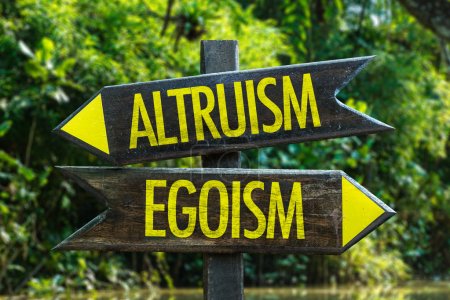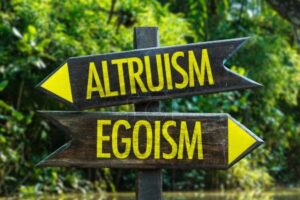« And so, if for millennia the task of common men and daydreaming philosophers alike had been to ask, “What happens if we die?”. Today we’re tasked with a goal far more challenging: that of examining what happens if we live. […] What if, for the first time in history, we’re building a civilization that relies not on death, but on the deployment of ethical technologies, for its enhancement? » Raiany Romanni, bioethics researcher, Harvard Medical School. Source.
Theme of the month: Longevity and Altruism
Introduction
The importance of wanting the good of others, for the sake of others (and not for any religious reason or moral obligation) is a concept that is far more important today than it was yesterday. The word altruism itself is less than two centuries old. It was created by Auguste Comte, as an antonym of the word egoism, in 1850. In this letter, we will not address philosophical questions about the deep reasons for altruism. What is important in this letter is that conscious solidarity is one of the reasons for the enormous social progress and longevity. Thus, never in the history of humanity have we been more concerned about others, starting with the elderly and therefore the weakest, than during the current Covid epidemic.
Altruism in animals
Altruism does not only refer to the conscious mobilization of humans for others. In biology, altruism refers to the behavior of an individual that increases the selective value of another individual while decreasing its own abilities. Altruistic behaviors in biology appear most obviously in kinship relationships, such as kin selection. They can also be observed in larger social groups, such as in social insects.
They allow an individual to increase the transmission success of his or her genes by helping related individuals who share those same genes.
Obligate altruism is the permanent loss of direct fitness (reproductive) (with the potential for indirect gain). For example, worker bees may forage for food for the colony (individual cost, but collective gain).
Optional altruism is a temporary loss of direct capacity (with a potential indirect gain from personal reproduction). For example, a Florida scrub jay may help at the nest, then gain parental territory.
Examples:
- Wolves and wild dogs provide meat to pack members not present at the kill.
- Mongooses support old, sick or injured animals.
- Meerkats often have a guard to warn of predator attacks while others are feeding.
- Male baboons threaten predators and cover the rear while the herd retreats.
- Bonobos have been observed helping other injured or disabled bonobos.
- Vampire bats usually regurgitate blood to share with unlucky or sick roosting companions who have been unable to find a meal, often forming a « buddy system. »
- Lemurs of all ages and both sexes will care for infants that are not related to them.
- Dolphins support sick or injured animals, swimming under them for hours and pushing them to the surface so they can breathe.
- In many bird species, a breeding pair receives support in raising their young from other « helper » birds, including help in feeding their chicks. Some will even go so far as to protect the young of an unrelated bird from predators.
Being altruistic may be good for your health!
What if helping others was not just an altruistic gesture? A study published in 2006 in Evolution and Human Behavior suggests that helping children, grandchildren, or more distant relatives may give a boost to longevity.
Scientists at the University of Basel in Switzerland studied 500 people aged 73 to 103. They found that those who cared for their grandchildren lived longer than those who did not: half of the caregivers were still alive 10 years after the study began, while half of the less devoted grandparents died within five years.
In the absence of grandchildren, direct assistance to children, such as housework, has the same effect on longevity. Prosocial behavior by grandparents towards children and grandchildren appears to set an example of altruism for future generations and inscribe this model in their nervous and hormonal systems.
Be careful, however, it is also possible that the differences can be explained by the fact that only healthy grandparents can take care of their grandchildren, because people in poor health have fewer children and therefore fewer grandchildren, less contact, fewer activities…
According to American researchers, the feeling of well-being acts on our genes and boosts our immune system. But happiness is differentiated into two different types and only altruism seems to be able to influence the human epigenome.
The immune system of altruistic people is found to be more developed than that of people experiencing hedonic well-being (i.e., cultivating one’s own emotions in order to feel happy), researchers reveal in their study published by the scientific journal Proceedings of the National Academy of Sciences (Pnas).
Specifically, after taking blood samples from 80 healthy volunteers, the researchers observed that the human genome seems to respond to a positive psychological state. In case of altruism, inflammatory genes decrease and antiviral genes increase, in order to protect the body.
Effective Altruism
The phrase « It’s the thought that counts » sounds nice, but it is actually morally untenable. Our altruistic actions must be measured by their effectiveness. Effective altruists advocate that we should estimate the « cost-benefit » of our actions to others. For example, providing food worth a certain amount of money may be less altruistic than investing the same amount in better agricultural production by farmers.
In the health field, funding care and medication to reduce the effects of age-related diseases is a useful act, but less so than funding research to end these diseases.
Of course, the outcome of these investments is not certain and the benefit is longer term. Most often, effective altruists invest in projects that are relatively easy to measure and therefore not in wide-ranging efforts such as research. Yet, the benefits of wide-ranging advances are considerable. One euro for care in a nursing home will benefit a few people. One euro for a therapy for a healthy life can benefit all.
The duty of altruism
Helping your fellow man in certain circumstances is a duty for most philosophical and religious currents. It is also a legal obligation whenever a person is in danger in some countries such as France or Germany. This is called the duty to rescue.
There have been cases where people have been prosecuted for this type of crime because they did not act correctly in view of scientific progress. If the demand and social pressure became strong enough, we could likewise consider it a crime not to invest in research for healthy longevity. The State, at least, could be legally, even constitutionally, ordered to make these investments (in the same way that it is today ordered to guarantee the health of its citizens).
Note that the fact that the outcome of the assistance is uncertain does not absolve the duty. A person who refuses to help an injured person cannot justify himself by saying that he would probably have died anyway. Therefore, the fact that the outcome of the search is uncertain does not mean that there is no duty.
In France and Belgium, case law generally considers that only the effect requiring immediate action should be considered. But this could change.
Long-term altruism
Many citizens, especially environmentalists, rightly insist on concern for future generations. In fact, it is also about current generations, because climate change and pollution will already have impacts in our lifetime. They even have some today. But the concern, the altruism for the future, is also to offer a healthier and much longer life to the children who will be born tomorrow.
Finally, we could say that there is even a form of altruism towards this other person who is oneself in the long term. Many of our behaviors are a choice between short-term interest (« bad » eating, smoking, distraction…) and long-term interest (exercise, study…). The choice to work for a longer and healthier life is in my opinion an altruism for one’s future self.
Good news of the month. Potentialities of gene therapies.
It is the genetic heritage that determines quite precisely the maximum lifespan of a human, any other mammal and most animals. The potential of gene therapies for longevity is expanding and becoming clearer. Renowned scientist George Church gave an interview on this topic for the organization Lifespan.io.
For more information
See:


